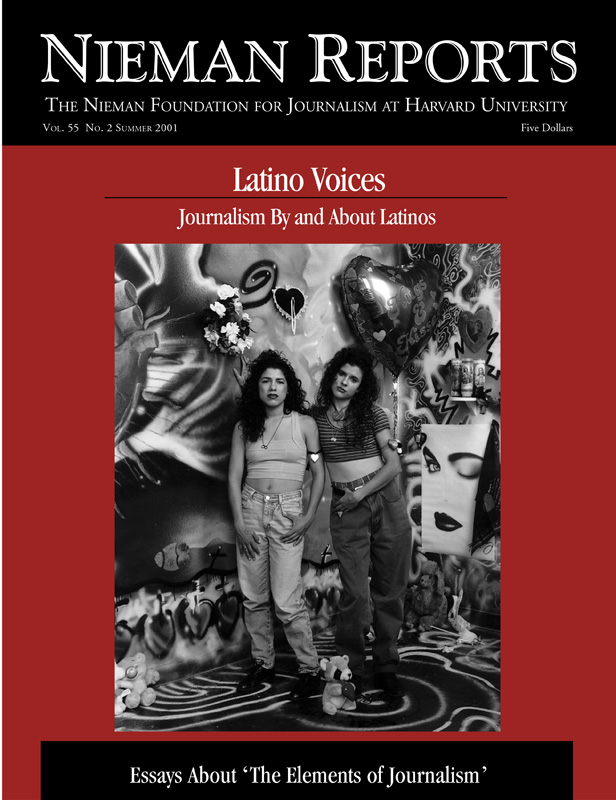
However closed China is, its people are resourceful in seeking and conveying information. International broadcasters, such as the Voice of America (VOA), have long demonstrated their ability to reach the Chinese people directly—in their homes and in their own languages—to provide reliable news and information through short-wave radio broadcasts. In addition, today, alternative uses of the Internet and satellite television can and do circumvent Chinese censors. As a result, in the midst of a potentially escalating crisis, many Chinese did hear an alternative voice, and an informative one.
The Chinese have attempted to jam VOA’s Mandarin broadcasts since the events in Tiananmen Square in 1989. They also attempt to block our Web site and those of other Western news organizations. During the recent crisis, our engineers told us that the jamming worsened. We know, however, that despite their government’s attempts to interfere with the flow of information, thousands of Chinese tuned in and logged on to the Voice of America and other international broadcasters, from the U.S. aircraft’s arrival at Hainan Island to the eventual release of the 24 crewmen and women. They did so because whether they approved of the actions of the U.S. government or not—and feedback to VOA during the crisis indicates that many did not—they knew from experience that they would get the straight story from VOA.
VOA’s reporting network enabled us to give a broad and nuanced view of the accident when the story broke on April 1. Our two Beijing-based reporters, Jim Randle and Leta Hong Fincher, were filing within minutes. They alternated coverage of briefings at the Chinese Foreign Ministry and the U.S. Embassy and kept up a steady stream of live interviews and correspondent reports that included Mandarin and English sound bites. Backstopping their reporting in Washington were our correspondents at the White House, Capitol Hill, the State Department and the Pentagon, as well as around the world, including on Taiwan.
We also got lucky. An additional veteran VOA Mandarin correspondent, Alexander Tien, who arrived in China just after the story broke, primarily to report on China’s bid to host the 2008 Olympics, subsequently provided extensive on-the-ground coverage. VOA reported on the developments in the story and provided expert analysis of the importance and meaning of events. While we might not be able to match the financial resources of commercial U.S. broadcasters, we believe that our human resources are unmatched in terms of understanding the languages and cultures of both the United States and China. Our China branch correspondents have lived extensively in China, Taiwan and the United States and variously speak Mandarin, Cantonese and Tibetan, along with English. Their experience and knowledge enable them to report on critical events such as the plane collision accurately and objectively, and in a manner that is meaningful to our audience.
How in fact did VOA cover this story? Many in the United States might be surprised to learn that the U.S. government’s principal overseas broadcaster, supported entirely by the taxpayers, covered the standoff in a balanced manner. With a foundation of almost 60 years of experience, VOA followed both its charter, which requires accuracy and credibility, and the tenets of American journalistic practice. Our journalists follow stringent coverage guidelines, including, for example, a two-source rule. Officials from both sides were heard, including Presidents George W. Bush and Jiang Zemin, Secretary of State Colin Powell and Chinese foreign ministry representatives, members of Congress and Chinese political officials.
We broadcast opinions and analysis from U.S. and Chinese experts, including business representatives from each country. Comments from family members of the crew and the wife of the Chinese pilot were reported, as were interviews with people on the streets of China, the United States, and Taiwan. In addition, VOA broadcast U.S. and international editorial and opinion round-ups. All of these features might seem commonplace from the perspective of a media consumer from a developed nation with a free media environment. But in the context of what usually happens in China, this is an extraordinary array of perspectives for the people to hear.
VOA provides this broad view of events in several languages of its Chinese audience. VOA news is broadcast daily with 12 hours of Mandarin, four hours of Tibetan, two hours of Cantonese, one and a half hours of VOA Special English (delivered with a slow rate of speech and a limited vocabulary designed for non-native English speakers), and our 24-hour “VOA News Now” standard-English programming. Six hours of the Mandarin broadcasts are simulcast on television weekly, and audience members in China are invited to call collect to join discussions with experts on U.S.-China relations and other topics.
Viewed hastily, this political, linguistic and cultural context might seem unimportant. But one need only consider the extent to which the crisis centered upon the wording of the American statements of regret and the Chinese demands for an apology to comprehend better the power of words. There are numerous examples where VOA and official Chinese media differed in their reporting on events surrounding this incident. Chinese media covered the event as an act of U.S. aggression, alleging that the Navy plane deliberately veered off course and collided with the Chinese aircraft. In contrast, relying on a variety of U.S. government and non-government sources, VOA reported that an accident occurred following interception of the U.S. aircraft 70 miles offshore by Chinese jets.
On the second day of the crisis, U.S. government officials stated that boarding the U.S. military plane was a violation of international law. VOA’s guest, James Feinerman, Professor of Asian Legal Studies at Georgetown University, agreed with the U.S. position, saying that he considered the boarding of the plane a violation of customary international law and that crafts forced to land in distress are subject to diplomatic immunity. However, a second VOA guest, Hungdah Chiu, Director of East Asian Legal Studies at the University of Maryland School of Law, disagreed, saying that the plane did not have permission to land in Chinese territory and that Chinese personnel were permitted to board the plane. VOA also covered divergent views surrounding China’s claim of an international boundary of 200 miles offshore, in contrast to the international standard of 12 miles adhered to by the United States.
The stark contrast between what was reported in official Chinese media and VOA’s comprehensive coverage sparked considerable audience feedback. E-mails and phone calls in English, Mandarin and Cantonese poured into VOA at the rate of several hundred a day from China. Most were scathingly critical of the United States—and VOA. Several Chinese lambasted their government’s competence before turning to us for even more blistering criticism. Some expressed disbelief of VOA’s coverage because of the disparity between VOA’s news and reports that were saturating the airwaves in China.
One wrote, “I trusted and liked your comments and news. However, your behavior during the embassy bombing and collision has disappointed us Chinese people. You only show concerns to your own pilot, but have no compassion and concern to the missing Chinese pilot.”
This differs markedly from other feedback we received in a complaint addressed to the editor, “For Pete’s sake…why aren’t you talking about the responsibilities of the American pilot? He is not going to risk the lives of 23 American service personnel because of a sky confrontation by a Chinese pilot(s). There is zero chance that a pilot of an American plane with 23 other Americans on board is going to engage in a sortie with a lone Chinese pilot.”
Another, a Mandarin listener, wrote: “I was a VOA listener, but not anymore. Your report [on the collision] is very biased and I feel regret and angry. I have to concede that the Chinese Government Party is corrupted, but you Americans are by no means decent, either, especially the U.S. government.”
In contrast, a university student noted in an e-mail message in early April, “I am glad that the VOA is objective and comprehensive in reporting the air collision accident.… You do not blame China for everything. I hope you will continue with your objective and fair reports. We students in Guangzhou are indignant about this, and the anti-American sentiment is on the rise.”
Direct contact with our audience through e-mail and call-in programs is not simply a nicety of customer service. The Chinese government, through intervention with the handful of Internet service providers in China, effectively blocks access to the news reports on VOA’s Web site, (voanews.com). VOA circumvents this obstacle by transmitting news reports to more than 108,000 individual subscribers to our e-mail news reports and more than 136,000 subscribers to our English-teaching materials in China alone. We understand that the subscribers in turn forward the news on to others, including listservs, producing a multiplier effect many times the initial subscriber number. In addition, we know from audience feedback, for example, that our TV simulcast programs are reaching university students in their dormitories. This is further evidence that China is more porous to information and news than U.S. and Western media have generally understood.
VOA’s balanced coverage of events in China itself demonstrates to our audience the nature and strength of our democratic system. We provided a modest antidote against the one-sided official Chinese media accounts of events in April. Despite the efforts of the Chinese government to block us out, the Voice of America was heard. We believe our reporting was unbiased and informative. Just as VOA has endeavored to do since its inaugural broadcast nearly 60 years ago, we reported news and information vital to our audience and the interests of our two nations. We believe that if we can give an audience the full story, they will be able to draw their own conclusions. Whether they approved of the U.S. behavior or not in April, our audience knows they can trust VOA to provide comprehensive coverage of the news.
Sanford J. Ungar has been the director of Voice of America since June 1999. Ungar departs VOA on July 1, 2001, to become president of Goucher College in Baltimore, Maryland.


